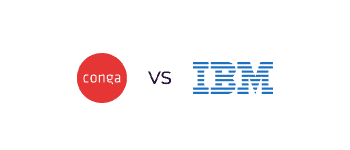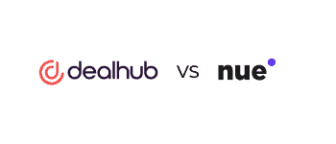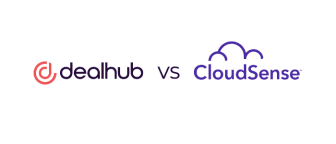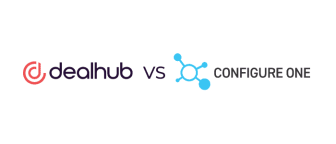Introduction
Compare Conga CPQ vs. IBM CPQ
CPQ software is an invaluable tool for sales teams, improving sales process agility and accuracy while helping to ensure that quotes are accurate and consistent. By automating, streamlining, and simplifying the sales quote process, CPQ solutions help to improve customer experience, reduce time to market, and save valuable time on repetitive tasks.
Conga CPQ and IBM CPQ are both cloud-based CPQ solutions that offer comprehensive features and capabilities to help organizations create, manage, and deliver quotes quickly and accurately. Both include features like guided selling, product configuration, and proposal generation. And each includes its own set of features to help automate and manage the sales quote process.
Conga CPQ is a tool built for complex sales contracts, and it is designed to manage the entire sales quote process while also providing access to detailed analytics. For businesses that need to quickly generate quotes and manage multiple versions, configurations, upsells, and cross-sells of products, Conga is a solid option.
IBM CPQ is primarily used by eCommerce and retail operations, but it is also suitable for complex sales with its comprehensive quote configuration capabilities. Its localized pricing engine and geographic support make it useful for multinational eCommerce sellers. It also offers advanced analytics, allowing users to quickly identify trends in their sales metrics and optimize their products accordingly.
Product Overview
Overview of each CPQ Solution
Conga CPQ and IBM CPQ are widely used quoting solutions that enable enterprises to sell complex products and services across channels. Here’s a quick rundown of the features and benefits offered by each product.
Defining Conga CPQ
Before there was Conga, there was Apttus, an innovator in its own right. Originally built for the Salesforce platform, Conga CPQ is now a standalone multi-channel sales solution that offers an array of CPQ and CLM features to help automate quoting and contract management.
At its core, Conga CPQ is built to make complex quoting easier. Enterprise companies use its self-service guided selling interface to quickly configure and generate one-time and recurring quotes. As they need to add or remove functions, Conga’s scalable microservices architecture allows users to easily add on or switch out features in their subscriptions.
The main benefits of the Conga CPQ platform are its speed, scalability, and ease of use. It is highly configurable and customizable, but it also offers a visually guided process. It can be used with numerous CRM systems (including Salesforce, the platform it was built on).
Defining IBM CPQ
IBM’s foray into the world of CPQ came in 2010 when it acquired its CPQ solution from Sterling Commerce. Now operating under the “IBM Sterling CPQ” name, This platform revolutionizes the purchasing and selling of intricate goods and services through all customers’ preferred channels, making it easier than ever for them to make purchases.
IBM Sterling CPQ is designed to transform the buying and selling of complex products and services across various channels. The solution automates pricing execution with a centralized system that enforces consistency. It guides customers, partners, call center reps, and sales teams to choose from a selection of quality products while ensuring accurate pricing.
Product Features
Comparison of Key Features
When examining each product, their differences become clear. Conga CPQ is designed for complex enterprise sales for many types of product and service businesses, while IBM handles the ecommerce side.
Conga CPQ is remarkably flexible in gathering customers’ exact specifications. With the ability to handle multiple pricing models including one-time, recurring and usage-based accounts, it is an excellent option for businesses with complex cost frameworks that are optimizing predictable revenue.
IBM Sterling CPQ’s standout features are its order management platform and inventory visibility functions. These help retailers deliver a seamless omnichannel experience while ensuring up-to-date data, even for companies with thousands of SKUs and multiple warehouses across different regions. IBM CPQ also integrates with other enterprise data warehouses and database tools, making it helpful for data science teams at large retail companies.
Another difference between Conga and IBM is in their approach to retail sales. While Conga is mainly designed for enterprise sales in the form of subscription models, digital services, and complex B2B eCommerce packages, IBM’s platform can provide store associates with the tools they need to sell more effectively on the physical sales floor.
Here’s a breakdown of each product’s features:
| Conga CPQ | IBM Sterling CPQ |
|---|---|
| Choose only the functionalities needed to complete business processes and operate them all using the same interface. | Streamline retail, eCommerce, and wholesale selling and seamlessly integrate with the IBM interface. |
| Integration library lets users with third-party software, including DocuSign, HubSpot, Salesforce Sales Cloud, Dropbox, and Google Drive. | Integrations with other systems through the Service Definition Framework, including ERP and data systems, including databases and data warehouses. |
| Relatively fast integration with minimal downtime and setup fees. | IT implementation takes a variable amount of time depending on the company’s amount and complexity of data and infrastructure. |
| Guided selling with real-time deal scoring speeds up the sales cycle and makes selling easier. | Provide store associates with mobile tools that enable a personalized in-store buying experience. |
| Scalable microservices architecture makes it easy for companies to customize Conga CPQ to their business needs. | Pricing and customization based on business needs and other IBM product offers. |
| Support for one-time, subscription, and usage-based pricing models makes managing different customers easy. | A seamless omnichannel customer experience that optimizes order fulfillment across multiple supply chain locations. |
| Unlimited configurations for complex products and services, rules-based pricing, and unlimited attributes for configuration available out-of-the-box. | Continuously optimize the order fulfillment process and reduce cost-to-serve with IBM Watson. |
| Visual product configurator makes it easy to manage models, discounts, shopping carts, and check-out processes. | Up-to-the-minute inventory tracking that makes it easy to sell to multiple customers and manage thousands of SKUs. |
| Subscription, renewal, and order management capabilities with asset-based ordering. | Complex billing capacity, automated product and billing configurations. |
| Cross-sell and upsell insights with full contract visibility that show sales reps where to offer additional products. | Inventory visibility, sales process analytics, and in-person reporting for brick-and-mortar and on-site retailers. |
| Automated approval workflows with cross-functional quote collaboration, plus audit trails. | Complete quote-to-cash automation with cross-functional collaboration. |
| Price optimization with price waterfall and cost analyses. | Profitability, discount structure, and revenue intelligence insights synced with a data warehouse. |
| Web-based platform with software integration | Web-based platform with custom-coded software integration |
| Phone support Email responses Community and forum FAQ and knowledge base Video tutorials Webinars New user training and onboarding | Phone support Email responses Community and forum FAQ and knowledge base Video tutorials Webinars New user training and onboarding Extensive third-party IT consulting |
Customer Size
Ideal Customer Profiles
Understanding the customer sizes and segments best-suited for each platform is critical when deciding which one will work best.
Conga CPQ is a viable solution for medium and large organizations with over 93% of its customers doing over $50M in annual revenue. It supplies unparalleled product configuration abilities that allow you to create tailored pricing proposals based on a variety of scenarios. This powerful technology offers an optimal balance between flexibility and automation—ideal for mid to large-sized companies.
IBM Sterling CPQ serves companies of the same sizes, but its customers have completely different product offerings, scope, and market use cases. It’s suitable for businesses with large retail catalogs that require quick and efficient order management, inventory visibility, and sales quoting capabilities. The platform is also designed to support a wide range of customer segments including B2B, B2C, and C2C.
It is also worth noting that Salesforce CRM customers would be better suited to use Conga CPQ to make their quoting process simpler and more efficient. IBM customers, on the other hand, will benefit from the seamless integration that IBM CPQ offers.
Because of their robust features, smaller businesses might find that either of these solutions are too complicated. In this case, they should look into simpler CPQ software that can meet the needs of their organization without the cost or complexity associated with larger platforms.
Customer Support
Support Features & Resources for Each Solution
CPQ implementation isn’t easy, especially when it comes to larger businesses with more than one office or location. When considering multiple offices or retail locations, global workforces, and different customer segments all under the same platform, it’s important to have reliable customer support.
Conga has excellent technical assistance with a dedicated team that quickly responds to any inquiries or issues you may face. IBM also provides an extensive library of resources for customers in addition to their responsive help desk staff.
In terms of support offered, their abilities are quite similar. But IBM edges out Conga thanks to its powerful and well-known platform with plenty of specialist consultants and third-party IT services providers that can help.
Pricing
Breakdown of Pricing Options
Pricing plays a critical role in the buying decision process, and the pricing models of Conga and IBM are similar.
As enterprise solutions, each product is offered on a quote basis (i.e., prospective buyers must contact sales for a customized quote).
When it comes to costs, IBM Sterling CPQ is more expensive because of its wide range of features and the support services it offers. And depending on how robust a customer needs the system to be (and what other IBM products they use), the product can quickly become even more costly.
Conga’s pricing is usually lower due to its focus on automation and configuration capabilities for large enterprises. Although it starts at around $35 per user per month for most users, this price rarely sits this low. It goes up depending on the number of features and integrations required (which also adds to its complexity).
It’s worth noting that the additional IT infrastructure, setup costs, and maintenance fees can quickly make the solution more expensive. Before investing in an enterprise CPQ solution, businesses should be aware they will need to budget for more than bust the per-month cost of the product.
To better understand pricing, here’s a quick look:
| Conga CPQ | IBM Sterling CPQ | |
|---|---|---|
| Product Pricing | Custom configuration – contact sales | Custom configuration – contact sales |
| Implementation Fees | One-time implementation fee | One-time implementation fee, plus setup costs for IT resources |
| Additional Licenses | Additional product costs on a per-use basis | Additional product costs on a per-use basis |
Summary
Considerations for Choosing Between the Two Solutions
When evaluating Conga CPQ and IBM CPQ, it’s essential to consider factors such as implementation complexity, user experience, and the specific needs of your business.
Conga CPQ is tailored for managing complex sales contracts and offers detailed analytics, making it suitable for businesses that require rapid quote generation with multiple configurations, upsells, and cross-sells. Its comprehensive approach streamlines the entire sales quote process, which can benefit organizations with intricate product offerings like media, technology service providers, and B2B software companies.
On the other hand, IBM CPQ is primarily utilized by eCommerce and retail operations but also accommodates complex sales through its robust quote configuration capabilities. Its localized pricing engine and geographic support are essential for multinational eCommerce sellers. Additionally, IBM CPQ provides advanced analytics that enables users to identify sales trends and optimize product offerings effectively.
Ultimately, the choice between Conga CPQ and IBM CPQ should be guided by your organization’s specific requirements, such as the complexity of your sales processes, the need for localized pricing, and the importance of advanced analytics in your sales strategy.
FAQs
Frequently Asked Questions
Apttus CPQ and Conga CPQ were once two products, but they went through a merger in 2017. Apttus purchased Conga CPQ in a $715 million deal and now operates under its name.
CPQ software has many different functions, depending on the business model and type. Here’s a general list of the most common CPQ features:
Product selection and configuration
Automated quote generation
Proposal and deal management
Sales management
CRM and ERP integration for data sharing and reporting
Fully-managed QTC (quote-to-cash) process
Real-time pricing and discounting
Subscription management
Salesforce offers its own CPQ solution, but Conga was built on Salesforce. Conga also remains one of the most popular apps on the AppExchange. However, Conga works regardless of whether its customers are concurrently using Salesforce, and the software offers many other CRM and ERP integrations for different business tech stacks.
Some CPQ solutions are easier than others. In the case of enterprise CPQ software, implementing it usually requires the help of outside specialists or an in-house IT team that can complete the setup and maintenance. It may also require some training for sales teams to get used to the new system. However, once it’s up and running, CPQ software is easy to use.

Rhonda Bavaro excels in boosting SaaS companies’ growth through innovative content marketing, thriving in the dynamic sales tech industry amidst evolving technologies that drive revenue acceleration.








